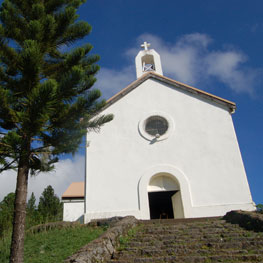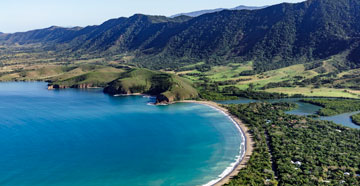In Balade, on the land of modern-day Pouébo, the first contact took place between Europeans and the Kanak people. English explorer James Cook landed there in 1774. Nearly 250 years later, the region still offers a panorama of dazzling landscapes and boasts an exceptional number of talented sculptors.
After this first episode in 1774, history was not done with Pouébo. Here as well in 1843 was where the first mass was celebrated in the territory by Marist missionaries who had just landed. Symbolically, it took place on December 25, under a banyan tree that still stands today!
A Marist monk, Blaise Barmoiton, met with a tragic fate in July 1847. This story is narrated on the stained-glass windows of the church in Balade. The grave of the Marist monk is also visible a short way from the church.
Balade: a place of history
In Balade again, to the north of the modern-day village of Pouébo, Counter-Admiral August Febvrier Despointes officially took possession of New Caledonia in the name of France on September 24, 1853 (now a public holiday). A monument to the left, before Mahamate, commemorates the annexation. Sixteen tribes now inhabit the beautifully luxuriant coastal plain edging the ocean on the east coast of Grande Terre.
Here, time continues to go by peacefully to the rhythm of the fruit harvests, including the banana, which is celebrated every year in October.
Soapstone sculture: a local pride
Pouébo’s reputation isn’t only based on banana farming. The village also has numerous sculptors. Although they work with different materials such as wood, they are particularly recognized for their work in soapstone. This is a perfect occasion to purchase a pretty souvenir for home.
- Information point in Pouébo
- Opening hours: Monday to Thursday : 7:30 - 11:30 and 13:00 - 16:00, Friday : 7:30 - 11:30 and 13:00 - 15:00
- Telephone: + 687 79 95 98
- Email: tourisme@mairie-pouebo.nc

In Pouébo, banana is king, so it’s no surprise that since 1997, the town has organized “Mwata Days” every year in October to celebrate the fruit. “Mwata”, which is prepared during the festivities, is a traditional culinary specialty using green bananas and coconut milk wrapped in a banana leaf during cooking. Another highlight is the bareback horse race on the beach! This unusual race attracts countless visitors!
Discover the must-sees in Pouébo
Voir plusBalade Memorial
The bay of Balade, located at the city of Pouebo, at the extreme north-east of New Caledonia, is historic in many respects. From James Cook to Admiral Desp...
Read moreIn the heart of nature
Besides its historic and modern cultural heritage, Pouébo now features many opportunities for discovery, both in the valleys and on the sea. The clear waters of Colnett Waterfall (under the eponymous mountain topping 1,505 meters), the white sand beach of Mahamate and Saint-Mathieu are truly enchanting locations.
Also, in the mangroves of Mazé Det, where you can “hike” on an eco-trail, located in the middle of the Nord and Est Coastal Zone, it is listed as a UNESCO World Heritage site.










